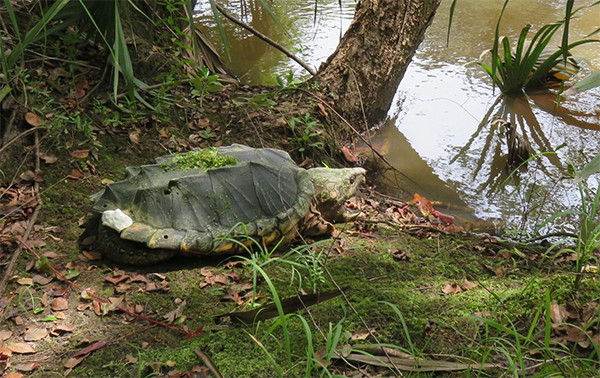By Tom Latek
Kentucky Today
The U.S. Fish and Wildlife Service is proposing to list the alligator snapping turtle, which is found in Kentucky and 13 other states, as threatened under the federal Endangered Species Act.
This proposal follows a review of the best available science which indicates that decades of overharvesting for domestic and international meat consumption, impacts from nest predation, recreational and illegal harvest and collection, and fishing activities are taking a severe toll on the turtle.
“These magnificent reptiles are sometimes called the dinosaurs of the turtle world because they look very prehistoric,” said Leopoldo Miranda-Castro, the Service’s Regional Director for the South Atlantic-Gulf and Mississippi-Basin regions. “The impacts of overharvesting and other human activities, along with the reality that they take up to 21 years to reproduce combined to put the alligator snapping turtle in peril. The Service will continue to work with all the state agencies to gather the necessary science to conserve and manage this iconic species.”
Alligator snapping turtles get their name from large, powerful jaws and shells that can resemble the rough, ridged skin of an alligator. While adult males can weigh up to 249 pounds, females are much smaller. Found in 14 different states across the Southeast, Midwest and Southwest, the alligator snapping turtle is the largest freshwater turtle in North America.
Factors affecting the future viability of these turtles include legal and illegal harvest, drowning as a result of by-catch from recreational and commercial fishing, hook ingestion, habitat alteration and nest predation. Historically, commercial and recreational take in the 20th century resulted in significant declines to many alligator snapping turtle populations. Commercial harvesting of alligator snapping turtles that depleted populations in Louisiana, Florida, Georgia, and Alabama is now prohibited in all states within its range. Recreational harvest continues in Louisiana and Mississippi but is prohibited in all other states where the species occurs.
Ongoing conservation measures the Service is undertaking on behalf of the alligator snapping turtle include captive rearing and release and habitat restoration and improvement at national fish hatcheries in Louisiana and Oklahoma.
In addition, the species is listed under the Convention on International Trade in Endangered Species of Wild Fauna and Flora, an international agreement between governments designed to ensure trade in specimens of wild animals and plants does not threaten their survival.
If you suspect someone is illegally removing live alligator snapping turtles, or any other species, please call the Service’s wildlife trafficking tips line at 1-844-FWS-TIPS (397-8477) or email [email protected]. You might be eligible for a financial reward if your tip helps solve a case. More information on how to report wildlife crime is available at www.fws.gov.

